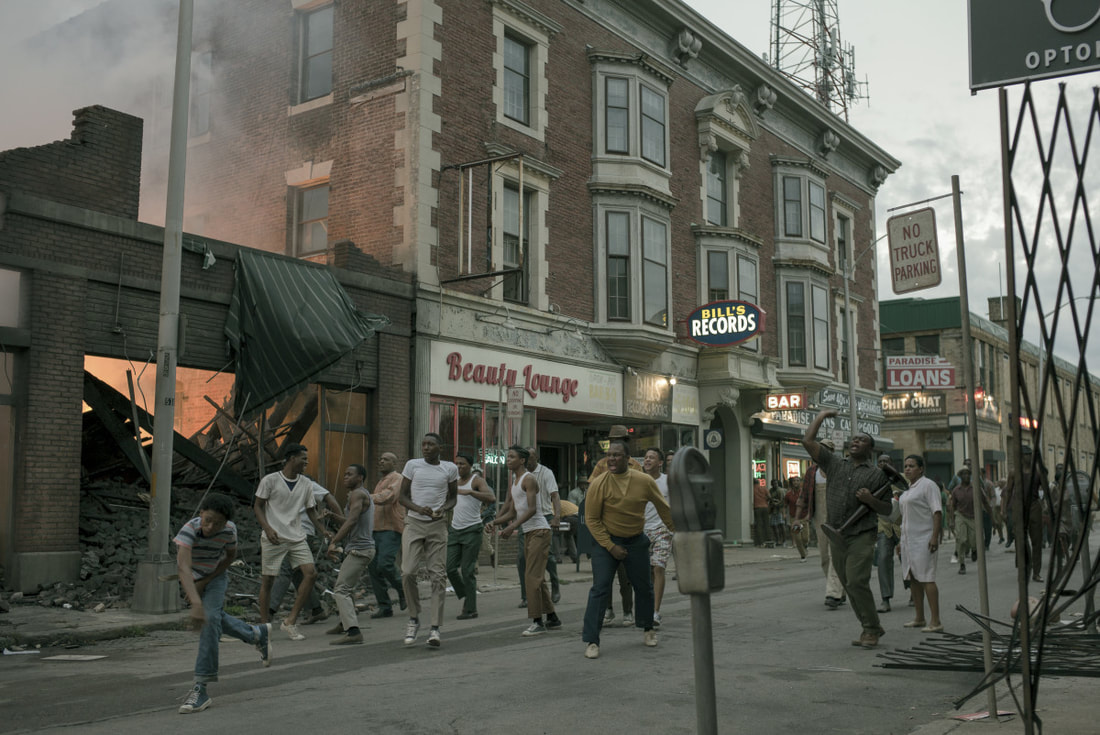Unlike many films portraying civil unrest, Detroit offers insight into a myriad of perspectives: African American rioters, law enforcement officers, victims of police brutality, grieving family members, and political leaders. The movie also shows the perspectives of white cops -racist and otherwise- and white victims of police brutality. Detroit subtly, intelligently illustrates that rioting and civil disorder are not simple issues. Director Kathryn Bigelow (of Hurt Locker and Zero Dark Thirty fame) finds a variety of ways to illustrate the strong emotions, differences of opinion, and historical intricacies that characterize not only the politics of the time but also the communities involved.
Indeed, Bigelow does this through dialogue, but she more importantly does this through imagery. She transitions between close-up, medium, and long shots to show the agony, horror, and enormous extent of the issues at hand. Her close-ups, which are often of individuals or of intimate shots between characters, are sometimes even more jarring than certain shots of violence because they poignantly convey characters’ deep-seated emotions.
The latter is also a credit to the actors. I found Jacob Latimore’s (who plays Fred) performance of particular note. He conveyed an impressive range of emotion on his face not only during the heart-wrenching raid but in reaction to events throughout the film. He stole the show- transitioning beautifully between fear, joy, hope, humor, and bravery.
During the film, I couldn’t help but think of the classic anti-colonialist film The Battle of Algiers (1966). This film depicts the Algerian struggle for independence, and there is a particular scene in which two white men drive through an Algerian neighborhood at night in order to plant and set off a bomb in a residential area. In Detroit, we are introduced to the primary antagonists, two racist white police officers, while they are similarly driving through a black neighborhood. The scene bore an eerie resemblance to the scene in The Battle of Algiers, and sure enough, the police officers soon shoot an unarmed black male in the back as he ran away. Detroit’s riot scenes also reminded me of similar mob scenes characterizing The Battle of Algiers, including sequences during which community leaders try to assuage citizens’ anger. The hotel in which most of the film takes place also happens to be named “Algiers Motel.” The last detail is based on truth (the entire movie is based on truth), but nevertheless I appreciated the striking similarity Detroit bore to that film. If it was indeed an homage to the classic film, I applaud Bigelow’s choice and think it both poetic and befitting.
However, Detroit was a disorganized film. Before the raid on the Algiers Motel, it is comprised of a motley of scenes of protests, of characters being introduced, and of everyday life. By the end of the film, I understood that these scenes were included in order to provide essential contextual and character background, but while watching I found it difficult to discern what the movie was really about. At times, I got the sense that it was simply a sequence of tear-jerking events meant to inspire empathy in the audience. I strongly believe that these scenes were necessary, but so many characters and so much information was introduced in a choppy manner over a short period of time. I would have liked to see a clearer arc in the rising action, or at least to have been alerted to what information and which characters were most essential to the plot.
The filmmakers did a commendable job in grounding the film, interspersing their own footage with historical photos and videos of the actual Detroit riots in 1967. These details drew attention to the painful reality of the events depicted and to the high quality of work done by Detroit’s cinematographers in recreating the time period. The film also utilized music from the 1960s -much of which was diegetic- but not to excess. Much of the sound in the film focused on the riots unfolding throughout the city, immersing the audience ever further into the setting.
That being said, the events in the film were tragically familiar. We are no strangers to hearing about police officers shooting unarmed people of color, sexually harassing women, or planting evidence at crime scenes. I believe Bigelow was intentional in releasing this film at this particular time in history, and that there is a bold, biting intelligence in her doing so.
One of the first lines we hear a police officer say in Detroit is, “If they’re not resisting, don’t push them.” It’s sad that anyone -especially a law enforcement officer- would need to be reminded of that in 1967, and even sadder that many need to be reminded today.
Grade: A-

 RSS Feed
RSS Feed
